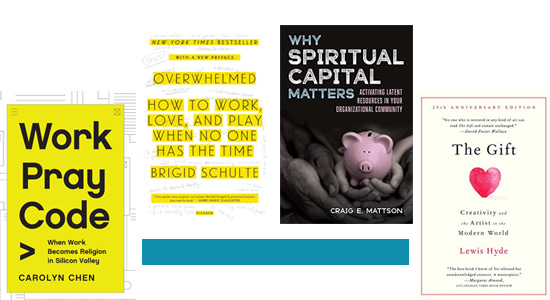Volume 1, Issue 12
Maybe your job’s just not that into you, says Carolyn Chen, but you’re probably very into your job. Despite the widespread chatter about the suckiness of American jobs, Chen’s recent piece in The Atlantic argues that many of us love our work too much. She speaks of “the invisible religion of work that’s become an unassailable part of our culture” and warns against what she calls a “theocracy of work.” Her new book Eat Pray Code about big-tech’s brew of spirituality and work notes that although fewer people are going to church, a lot more people—at least in the tech industry—are going to work as if it were church.
And, argues Chen, what happens in Silicon Valley does not stay in Silicon Valley. So you can expect meditation rooms, spiritual advisors, “compassion research days,” Search Inside Yourself workshops, and “mindful lunches” to arrive in your workplace soon.
Chen is hardly alone in identifying the growing place spirituality takes in professional life today. Some examples I just cited come from Tara Isabella Burton’s mapping of corporatized spirituality in her book Strange Rites. You can find the backstory of spirituality-at-work projects in Jonathan Crary’s description of business administrators who, as far back as the late-nineteenth century, have sought to manage the inner lives of their employees. My own qualitative research among organizational leaders suggests that many professionals in social entrepreneurial companies use spiritual capital to circulate economic and social capital. You can’t quite seem to totally separate the spiritual from your job—and that leads us to the next part of our conversation.
This Substack explores the workplace cultures of early-career professionals. I use this space to think out loud about what I’m hearing from people in their first decade of work. For Gen Zs and millennials, I’m learning, workplace spirituality takes at least four distinct spiritual postures: the Survivalists, the One-Lifers, the Pragmatists, and the Aesthetes.
(No pictures of interviewees today! And no real names. I’m trying to avoid tucking complexly lived experience into overly tidy categories.)
Let’s start with the Survivalists. For them, spirituality is a delicate piece of human life. I’m thinking about one entrepreneur, Brigid, who gets up at 2:30 AM to meditate and journal and nurse her son for the hours before dawn. Brigid is no religionist. But I found her attitude showing up among people of faith, too. They might never talk about their faith at work, but private spirituality isn’t finally about what you do at work; it’s about preparing for what you do at work. Work and life balance requires work and life segregation.
And then there are the One-Lifers. I first noticed this mode thanks to Kendra Foley, who’s a Gen-Xer like me. (I tell her story here.) But she helped me see that Gen-Zs and millennials often want to treat spirituality as a way to heal the divisions of professional and private life. Let me cite Brice’s story. For him, life today suffers from fragmentation: “here you have business and work, and then over here we have church, and over here I have philanthropy, and then maybe volunteerism and family and then friends.” Correcting that segregation has required his family to move closer to his workplace. In their now more holistic life, he says, “we’ve made choices to walk to the nearby restaurants and the nearby coffee shops and go down and spend time in the community garden.”
The Pragmatists also see spirituality as integral to work, but for them it’s all about getting stuff done. Jaclyn told me that in a sprawling nonprofit environment, you run into people of every religious persuasion. Being a spiritual but not religious person enables her to connect with everybody. If you’re a churchgoer, Jaclyn gets you. She might even go to church with you once or twice. But if you’re a “none,” she’s still got your back: she can talk deconstruction, and she gets why people leave organized religion. For her, spirituality is about getting along to get things done.
Finally, the Aesthetes tend to have a rather artistic appreciation for spirituality at work. Encountering the human mystery of others and experiencing magic, almost telepathic connections on the job helps cultivate gratitude and wonder—and a bit of a holiday from the grind of capitalist productivity. I’m thinking of Sarah who works in big tech. She told me that she’s fascinated by conversations about spirituality. It’s amazing, she says, when people open up and talk about their passions. Don’t let all the quantitative aspects of this job smoosh your soul, she cautions. Your life’s a venturesome tale!
If we suss out this story data into an informal cluster analysis, we get something like the following chart:
My research suggests that early-career professionals deal with questions that the rest of us sidestep. Maybe because Gen Zs are economically precarious, they can’t afford to keep their spiritual lives on the downlow. Or maybe it’s because the rest of us tend to be practical atheists at work, keeping mum about matters of faith. Younger professionals know that it just won’t do to be discreet about big questions; spirituality matters too much when life itself is too much. Sure, institutional faith is declining, but what Tara Isabella Burton calls intuitional faith has only increased.
But there’s more in the data than “Hey, everybody, spirituality at work matters!” My interviews with early-career professionals also suggest that spirituality at work needs a mode-switch now and then.
Their stories, week after week in this newsletter, point to a lot of different ways to be spiritual at work. The wisdom here seems to be, don’t get locked into just one mode, and don’t enforce that mode on others. Sometimes, I get stuck in a mode of private contemplativeness (the Survivalist above) when others need me to shift to generous practicality (the Pragmatist mode above). Other times, I’m trying so desperately to get all the parts of my work and life to fit together (the One-Lifer approach) that I forget to just, as I think Dorothy Bass would put it, receive the day as it comes (and that’s the Aesthete). Moving among these modes may be a good way to revise the question we started with. The big question for spirituality at work isn’t whether we love our jobs, but how we should love them.
Being spiritually attuned at work isn’t just about finding personal meaning, after all. It’s also about coming alive to the gifts that move in human community in and around the workplace. Gifts like attunement, virtuosity, and what Wendell Berry might call sabbath moments—all these can make vocation vital.
Maybe the best way to love your work is to love the gifts that your work makes visible.
Who I’m Learning from
This week, I’ll point you to four books that explore the postures of spirituality at work we’ve discussed in this column:
Overwhelmed: Work, Love, and Play When No One Has the Time by Brigid Schulte
Why Spiritual Capital Matters by… well, me!
Work Pray Code by Carolyn Chen
The Gift by Lewis Hyde
Which of the four modes strikes a chord with you? Or do you feel like you bounce back and forth between them? I’d love to hear what you think! - Craig















Share this post